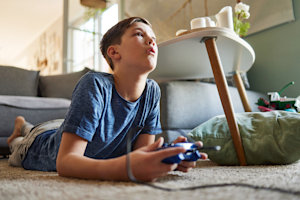
Digital wellness
Celebrating Media Literacy Week: Media Stamped wins international recognition
Award-winning digital literacy resources now available to Canadian educators.
Read article
Kimberly Bennett
Sr. Project Manager, TELUS Wise

Is social media making you feel bad? If it is, you’re not alone. Filters, poses, makeup and photo editing have created a world of unattainable beauty and body image standards.
Social media use in Canada is only growing, along with the associated self-esteem issues. According to a March 2021 report by Statistics Canada, social media was used regularly by:
The report also highlighted some of the negative implications of pervasive social media use including increased social comparison, false positive self-representation, lower self-esteem and increased feelings of loneliness.
Self-esteem is about finding worth in your own abilities and achievements. Many people, particularly youth, experience diminished self-esteem after prolonged exposure to the highlight reels on social media.
Kaylee Walker has written about her experiences. She entered an op-ed competition run by Arianna Huffington-founded Thrive Global in partnership with Write the World. The topic? Unplugged: how social media and technology has impacted your well-being.
Her article, My Social Feed Was Hindering My Self-Esteem, and It Might Be Doing the Same For Yours, was published in June 2019, as part of the Thrive Global on Campus series. Her message is powerful and continues to ring true as social media’s influence continues to accelerate amongst youth.
For Kaylee, being bombarded with images of thin celebrities and endless ads for beauty products made her question her own self worth. She writes:
“I know from personal experience that time spent on Instagram is only time wasted as I compare myself to the godly portrayals of fitness influencers and other highly accomplished individuals. These portrayals, while illusory, have skewed my perception of what is truly important. I’ve noticed my values shift from academic success and lifelong fulfillment to petty weight loss and visible collarbones. This led me down a dark hole that I have yet to escape, a world in which my outward appearance trumps all other matters of importance.
Since deleting my Instagram and taking time to observe “real world bodies,” I have been able to reconstruct my views of beauty and realign myself with life’s greatest pleasures. Shockingly, they don’t involve having a flat tummy or bowls of watery protein ice cream.”
In 2004, Dove recognized how influential media can be on people’s perceptions of beauty. The company launched The Dove Self Esteem Project with the goal of helping the next generation develop a positive relationship with the way they look, so they are not held back by appearance-related anxiety and can realize their full potential.
Since launch, The Dove Self-Esteem Project has reached more than 69 million young people across 142 countries, making it one of the largest providers of body confidence education globally.
The Evolution film was Dove’s first foray into upending unattainable beauty standards by addressing image manipulation in advertising. Media has obviously changed since 2004, but Dove’s mission hasn’t. The company’s conversation about healthy beauty has now shifted to focus on social media.
New research from The Dove Self-Esteem Project (based on surveying Canadian girls aged 10 to 17) has found:
Importantly, girls said that if images on social media were more representative of the way girls look in everyday life, they would feel more confident:
This research and its alarming findings inspired Dove to create its latest film, The Reverse Selfie, which tackles how retouching applications can distort reality. Promoting positive self-esteem What can you do to combat the distortion deluge of social media and promote positive self-esteem, especially with the youth in your life? Some strategies to consider include:
Social media and self-esteem have become inextricably linked – sometimes positively, but more often negatively. Healthy, balanced conversations and points of view are critical. If you have kids in your life struggling with self-esteem as a result of social media, let them know they aren’t alone. Seek out education from sources like The Dove Self-Esteem Project to help them understand what they see on social is not an accurate measure of anyone’s worth.
To learn more about building and maintaining a healthy relationship with technology and for tips on ensuring your well-being in our connected world, take the TELUS Wise happiness workshop. Visit telus.com/WiseWorkshops

Award-winning digital literacy resources now available to Canadian educators.
Read article
Learn how gaming and gambling features blur for kids.
Read articleLearn how screen time triggers dopamine responses. Students explore digital media's biological impact and develop healthier digital habits.
Watch video